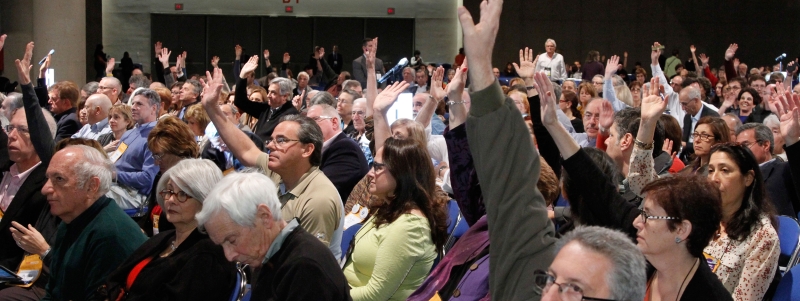We are instructed in the Holiness Code (Lev. 19:33) to take to heart the lessons of our own history by treating aliens in our midst with justice and compassion. "When a stranger sojourns with you in your land, you shall do him no wrong. The stranger who sojourns with you shall be to you as the native among you, and you shall love him as yourself for you were strangers in the land of Egypt." Judaism affirms the supreme value of human life and the equal dignity of every human being. The prophets of Israel bade us to pursue justice, seek peace, and build a society of loving-kindness among all of God's creatures.
The history of the Jewish people from Egypt through the Holocaust and continuing today is the story of a group forced time and again to flee the lands in which it resided. Repelled often in times of greatest need, Jews recognize the necessity for havens for the persecuted.
Thousands of men, women, and children are fleeing oppressing, torture, and murder and are seeking a haven in the United States and Canada. The United States did sign the United Nations Convention relating to the status of refugees, which states: "No contracting state shall expel or return a refugee in any manner whatsoever to the frontiers of territories where his life or freedom would be threatened on account of his race, religion, nationality, membership in a particular social group, or political opinion." The Refugee Act passed by Congress in l980 provides for the grant of asylum to any refugee demonstrating a "well-founded fear of persecution on account of race, religion, nationality, membership in a particular social group, or political opinion."
The above notwithstanding, the United States continues to arrest and deport refugees who have a well-founded fear of persecution. In response to this situation, hundreds of churches and synagogues have offered "sanctuary" to Central Americans fleeing violence and oppression. The concept of "sanctuary" embodies various actions, including legal assistance, material support, financial support, public advocacy and education, and/or temporary physical shelter. In addition, four American cities have declared themselves to be "sanctuary cities," affirming that those undocumented refugees receiving services from the cities will not be turned over to the Immigration and Naturalization Service.
Some of these actions are presently interpreted by the United States government to be violations of law and there have been arrests and convictions of persons participating in them.
The prophet Nathan offers an exemplary biblical model for confronting a state authority that wields its power unjustly and abusively. To a show of might, Nathan responds with rights, with truth.
THEREFORE, BE IT RESOLVED THAT the Union of American Hebrew Congregations:
- Asks that the government of the United States fairly applies the Refugee Act of l980 without regard to the political relationship between the country fled and the United States.
- Favors the passage of legislation that would temporarily suspend deportations of those fleeing El Salvador, Guatemala, and oppressive regimes until such a time as refugees can safely return to their countries of origin.
- Acknowledges that religious institutions do not stand outside the law and that any act, whether by individuals or institutions, that may be judged outside the law requires deep and prayerful consideration. Nevertheless, this administration's selective interpretation of the law and the human tragedies that have resulted from that interpretation call for a moral response from us as Jews. Accordingly, we urge our congregations and their members to provide sanctuary in one or more of its forms to Central Americans and other refugees who request safe haven out of fear of persecution upon return their to their homelands. We recognize the serious legal implications of some forms of sanctuary and alert the congregations to the recent prosecutions for assistance and support of these refugees, even as we commit ourselves to support the efforts to overturn the administration's interpretation and application of existing law.
-
In addition, calls upon our congregations to:
- Provide material and financial support to organized religious or humanitarian entities with aid earmarked for persecuted individuals.
- Sponsor counseling for refugees to explain the remedies that are available under the Immigration and Naturalization Act.
- Create funds or programs to meet the refugees' legal, psychological, counseling,
- Urges our congregations to join with like-minded groups to ask local governments to declare themselves "sanctuary cities."
Give to the URJ
The Union for Reform Judaism leads the largest and most diverse Jewish movement in North America.
